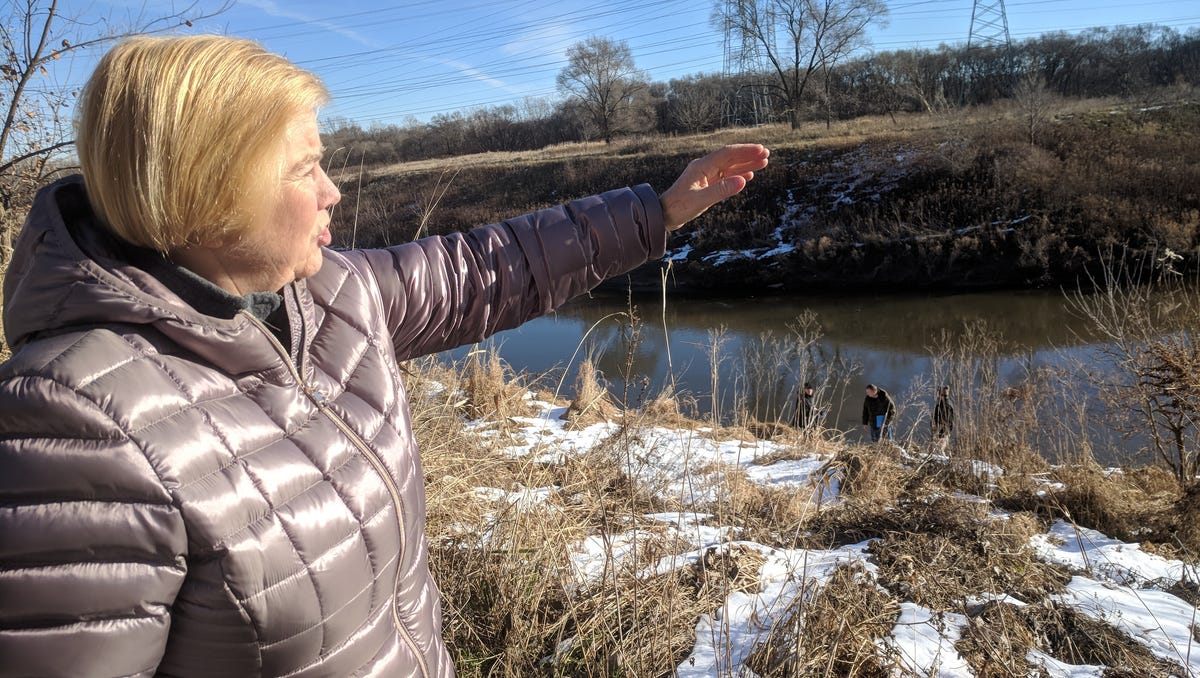Oakland County’s combined sewage and stormwater overflows are violating state environmental laws, the Michigan Department of Environment, Great Lakes and Energy found. And the county must take immediate action and faces potential fines and other costs.
Oakland County’s sewage overflows in significant rain events are a longstanding point of contention with its downstream neighbor, Macomb County, where officials say they bear the brunt of the environmental impact. Oakland County’s George W. Kuhn Drainage District Dequindre Interceptor Overflow Structure, a retention basin, during times of heavy rain can discharge untreated or partially treated sewage into the Red Run Drain, a major stormwater canal in Oakland and Macomb counties that flows to the Clinton River and eventually to Lake St. Clair.
The Michigan Department of Environment, Great Lakes and Energy on June 27 notified Oakland County Water Resources Commissioner Jim Nash that the county has “failed to correct the occurrence of sanitary sewer overflows” from its Dequindre Interceptor. EGLE, in its enforcement notice, cited two particular overflow incidents as violations:
An April 3 event in which the Oakland County facility “discharged 1.18 million gallons of untreated or partially treated sewage.”An Aug. 24, 2023, incident in which 2.2 million gallons of “untreated or partially treated sewage” were discharged.
“The discharge of untreated or partially treated sewage from a sewer system onto land or into the waters of the state is a violation of Part 31” of the Michigan Natural Resources and Environmental Protection Act, which aims to protect the quality of Michigan’s surface and groundwater and regulates wastewater disposal, stated Laura Verona, supervisor of the Warren District Office of EGLE’s Water Resources Division.
The notice states that Oakland County was previously notified of the need to address the sewage overflows in violation notices issued on Sept. 21, 2023, and April 29, 2025. EGLE is calling on Oakland County “to immediately undertake all actions necessary to resolve all violations identified.”
Among EGLE’s requests is that Oakland County review hydraulic models of its sewer system to identify areas of high inflow, model how operational changes would modify flow distributions, and provide a plan to evaluate interactions between the Great Lakes Water Authority system and the Kuhn facility “to identify opportunities for improvement in either or both systems to eliminate these SSOs (sanitary sewer overflows).”
EGLE proposes an administrative consent order to formally resolve the violations that would include “a compliance program and applicable fines or penalties to resolve the aforementioned violations.” Verona further stated that the EGLE Water Resources Division reserves the right “to take all necessary and appropriate enforcement actions for all violations,” including “seeking civil fines, injunctive relief, natural resources damages, and all costs associated with this enforcement action, including attorney costs and any other relief available to the (division).”
Macomb’s Miller expresses vindication of longstanding concerns
Macomb County Public Works Commissioner Candice Miller has for years been very vocal on how Oakland County’s inadequate sanitary sewer infrastructure and the resulting overflows have fouled Macomb County’s waterways, including Lake St. Clair. She sounded a note of vindication with news of EGLE’s latest enforcement action.
“We are applauding EGLE for taking this punitive action against Oakland County for continued violations of state law prohibiting the discharge of raw sewage that threatens public health and the environment,” Miller said.
“What’s crystal clear today is that the state is not satisfied with Oakland County’s actions for years of repeated sanitary sewer overflows and is ratcheting up the pressure by forcing Oakland to take meaningful steps to prevent further illegal discharges — and rightfully so.”
Miller said EGLE’s Water Resources Division for years failed to correct Oakland County’s repeated discharges, but “obviously their plan to fix their serious problem of dumping on a neighboring county was rejected by the state, leading to this stepped-up enforcement action.”
Oakland’s Nash: Miller ‘playing politics’
A statement issued Monday, July 14, from the Oakland County Water Commissioner’s Office noted Nash has strongly advocated with EGLE that a regional solution must be pursued to alleviate the incidents that occur as a consequence of southeast Michigan’s topography during increasingly frequent large rain events.
“In fact, the Dequindre Interceptor is working as it should,” Oakland County officials stated.
“Without this regional approach, Oakland County, Macomb County and southeast Michigan will continue to be faced with the prospect of sewage overflows and basement backups due to extremely heavy rainfall.”
The office then turned its attention to Miller.
“Macomb County’s Public Works Commissioner is trying to create controversy where there is none — choosing to play politics and cast blame on Oakland County instead of working with the Great Lakes Water Authority on a regional solution that protects all communities in Southeast Michigan,” they stated.
“While it may now be politically convenient to Commissioner Miller’s inflammatory approach, the fact remains that in December 2023, after the region experienced a particularly bad rain event in April, she co-signed a letter with Commissioner Nash to seek that regional solution with the Great Lakes Water Authority (GLWA). She has since turned her back on that, apparently, and would rather target Oakland County with inaccurate press releases to the media than come to the table and work on the regional solution she herself endorsed. That is not effective local government.”
Nash’s office stated they will meet with EGLE officials over the enforcement notice later in July and will discuss “the issues with large rain events, the current system for handling them, and the urgent need for a regional solution that protects Southeast Michigan.”
Contact Keith Matheny: kmatheny@freepress.com.

